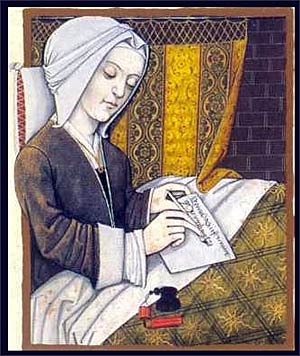Readings:
Song of Songs 3:1–5
Psalm 71:17-23
1 Thessalonians 3:6-13
Mark 8:22-26
Preface of a Saint (1)
Draw the souls of thy people into thy love, O God; that, like thy servant Mechthild, we may yearn to be fully thine, for thou dost know us better than we can know ourselves; through Jesus Christ our Lord, who liveth and reigneth with thee and the Holy Ghost, one God now and for ever. Amen.
PRAYER (contemporary language)
Draw the souls of your people into your love, O God, that like your servant Mechthild, we may yearn to be fully yours, for you know us better than we can know ourselves; through Jesus Christ our Lord, who lives and reigns with you and the Holy Spirit, one God now and for ever. Amen.
Lessons revised in Lesser Feasts & Fasts 2024.
Return to Lectionary Home Page
Webmaster: Charles Wohlers
Last updated: 20 March 2025
MECHTILD OF MAGDEBURG
MYSTIC, c. 1282
 Mechthild of Magdeburg (c. 1207 – c. 1282/1294), a Beguine, was a Christian medieval mystic, whose book Das fließende Licht der Gottheit (The Flowing Light of Divinity) described her visions of God. She was the first mystic to write in German, as she did not know how to write in Latin.
Mechthild of Magdeburg (c. 1207 – c. 1282/1294), a Beguine, was a Christian medieval mystic, whose book Das fließende Licht der Gottheit (The Flowing Light of Divinity) described her visions of God. She was the first mystic to write in German, as she did not know how to write in Latin.
Definite biographical information about Mechthild is scarce; what is known of her life comes largely from scattered hints in her work. In 1230 she left her home and “renounced worldly honour and worldly riches”to become a Beguine at Magdeburg. There, like Hadewijch of Antwerp, she seems to have exercised a position of authority in a Beguine community. In Magdeburg she became acquainted with the Dominicans and became a Dominican tertiary. It was her Dominican confessor, Henry of Halle, who encouraged and helped Mechthild to compose The Flowing Light.
Her criticism of church dignitaries, religious laxity and claims to theological insight aroused so much opposition that some called for the burning of her writings. With advancing age, she was not only alone, and the object of much criticism but she also became blind. Around 1272, she joined the Cistercian nunnery at Helfta, who offered her protection and support in the final years of her life, and where she finished writing down the contents of the many divine revelations she had experienced.
Mechthild’s writings are formed of the seven books that constitute Das fließende Licht der Gottheit (The Flowing Light of Divinity), which was composed between 1250 and 1280.
What is unusual about her writings is that she composed her work in middle low German at a time when most wisdom literature was composed in Latin. Thus she is remembered as an early proponent and popularizer of German as a language worthy of the divine and holy. Mechthild’s writing is exuberant and emotional: her descriptions of her visions are filled with passion.
While her work was translated into Latin during her lifetime, her work was largely forgotten by the 15th century, but was rediscovered in the late 19th century. Her work has been increasingly studied, both for its academic interest and as a work of devotional literature.
It is unclear when Mechthild died. 1282 is a commonly cited date, but some scholars believe she lived into the 1290s.
more at Wikipedia